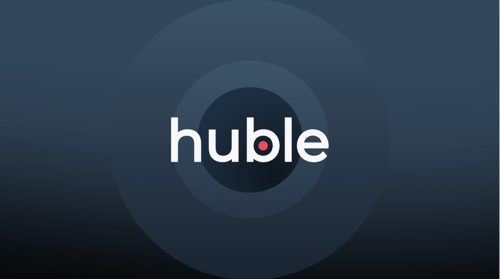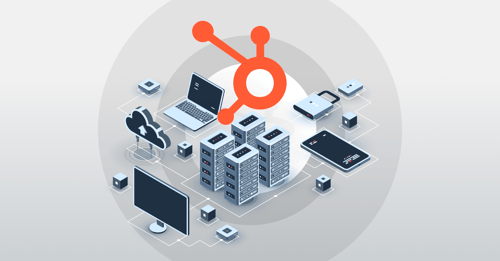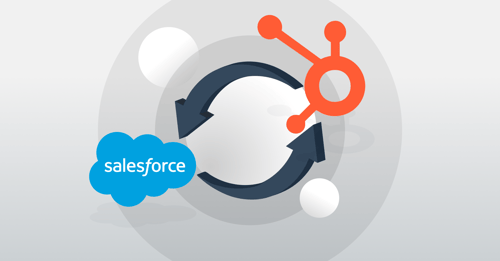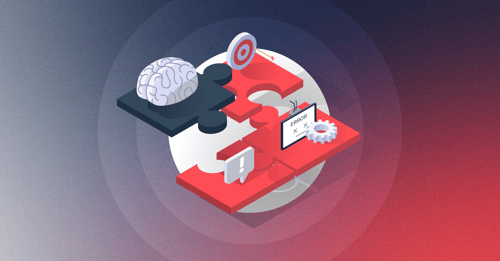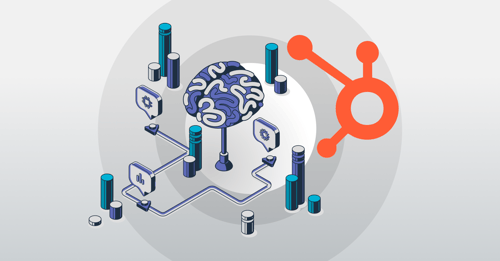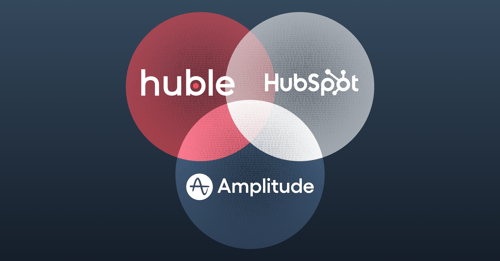In this guide, you'll learn all about HubSpot's Content Hub, including the key benefits, features and pricing, what's changing for CMS Hub users, and how Content Hub differs from Marketing Hub. We also provide actionable tips on how marketers can get the most out of HubSpot Content Hub.
In recent years, the customer journey has changed considerably. Many people now consume a variety of content across multiple platforms, from websites and social media to podcasts and review portals.
For marketers, this shift means that they need to meet buyers at different touchpoints in various formats. With the constant need for unique, high-quality content across multiple channels, efficiency in content creation and content management is key to success.
To streamline content creation and management, HubSpot launched the new Content Hub in early April 2024.
Content Hub is an all-in-one, AI-powered content marketing software that helps marketers manage the growing demands of content creation and management. It provides personalised content experiences tailored to every step of the customer journey, all from one central platform.
In this guide, you'll learn all about HubSpot's Content Hub, including the benefits, features and pricing, and how it can streamline your marketing efforts.
HubSpot’s Content Hub: a centralised solution

HubSpot's Content Hub, which evolved from the former CMS Hub, is an all-in-one platform designed to streamline content creation, management, and optimization. By combining website management, blogs, landing pages, and AI-powered tools under one roof, Content Hub enables marketers to deliver personalised, high-impact content experiences with greater efficiency.
With features tailored to support every stage of the customer journey, Content Hub empowers teams to manage content at scale, automate repetitive tasks, and maintain brand consistency across multiple channels. Its intuitive interface, combined with powerful AI capabilities, makes it easier to create, repurpose, and optimise content, all from a single platform.
In addition to unifying content marketing efforts, Content Hub also integrates seamlessly with HubSpot’s Marketing Hub, CRM, and Sales Hub. This ensures that marketing, sales, and customer service teams can collaborate effectively, share data, and drive more meaningful engagement with prospects and customers.
In the following sections, we’ll explore the key benefits, features, and use cases of HubSpot Content Hub, and how it can transform your content marketing strategy.
Key benefits of HubSpot Content Hub
It’s clear that HubSpot's Content Hub offers a range of benefits tailored to the evolving needs of marketers to drive success across the entire customer journey.
Let’s have a look at the key benefits:
- Personalised content experiences: Content Hub aims to enable marketers to create personalised content experiences that resonate with their target audience at every touchpoint of the customer journey.
- Save time and increase team efficiency: Content Hub features for content creation and management, such as the repurposing of content and content governance features, enable marketers to optimise their workflows and increase their team's productivity.
- AI-powered tools: Content Hub leverages AI to automate and optimise various aspects of content marketing, which means marketers can use AI tools, from AI-driven content creation to idea generation, to improve their content strategies while saving valuable time.
- Standardised campaigns: As a marketer with a team operating across multiple regions, I understand the challenges of coordinating marketing efforts across different channels and touchpoints. HubSpot's Content Hub is designed to overcome these challenges and facilitate the creation of cohesive marketing campaigns that work across multiple locations and channels. By standardising processes for creating and distributing content on one platform, marketers can ensure consistency and alignment across their marketing activities, improving brand messaging and customer engagement.
- Increase efficiency and save resources: By automating repetitive tasks, optimising content performance and providing actionable insights, Content Hub aims to enable marketers to do more with less and maximise the impact of their content marketing efforts.
In summary, HubSpot's Content Hub provides marketers with a comprehensive solution for creating, managing, and optimising content throughout the customer journey.
Now let's take a closer look at Content Hub's features and tools and their use cases for marketers.
Content Hub's features, tools and use cases: everything marketers need to know
The main use cases of HubSpot Content Hub are content creation and content management: the platform enables marketers to focus on creating personalised content experiences that drive engagement while also streamlining content management processes for maximum efficiency and effectiveness.
Let's delve into Content Hub's main features before we dive into specific tools and their use cases.
1. Create content
Overall, HubSpot’s Content Hub is designed to optimise the content creation process and help marketers deliver high-quality, relevant content that drives engagement and creates a deeper connection with their audience.
Let’s look at the specific features for content creation in more detail:
- Website optimization:
Content Hub offers several tools and features to optimise your website. Content Hub’s Website Builder tool empowers marketers to create and modify web pages, ensuring a seamless user experience and driving conversions with drag-and-drop editing and customizable themes.
Additionally, Content Hub’s smart content feature enables marketers to personalise the images and content on your website by verticals or other segments to create a targeted experience for specific customers without compromising the experience for the rest of your customers.
You can also create landing pages and forms with simple drag-and-drop editors as well as effective CTA’s that you can test and optimise. - Content and image creation with AI:
Using HubSpot’s AI chatbot ChatSpot, Content Hub includes an AI-powered Blog Post Generator that simplifies the process of generating engaging blog content.
Marketers can generate topics, titles, and targeted keywords, allowing for a steady flow of high-quality content. Content Hub's AI Image Generator also enables the creation of custom images that complement your brand's messaging across various platforms.
Furthermore, Content Hub's AI Translations feature facilitates seamless translation of content into multiple languages, enabling you to connect with diverse audiences on a global scale. - Content repurposing strategies: Maximising the value of existing content through repurposing is a cost-effective strategy. Content Hub's Content Remix feature enables marketers to repurpose content for various channels and formats, including during written text into podcasts.
- Enhanced accessibility: Embracing audio content with Content Hub's Post Narration module ensures inclusivity and accessibility for all audience members, catering to those with visual impairments or audio content preferences.
- Brand consistency: Maintaining a consistent brand voice across all channels is crucial for building trust and recognition. Content Hub's Brand Voice feature allows you to define and reinforce your brand's tone and style, fostering consistency and cohesion in your messaging.
- HubSpot’s App marketplace: HubSpot’s Apps Marketplace that includes apps that can be connected to HubSpot also live in the Content Hub. The marketplace connects HubSpot with content management systems such as Wordpress and Webflow, as well as design apps such as Canva and video hosting apps such as Zoom, On24 and HotJar.
2. Manage content
Content Hub is designed not only to simplify content creation, but also streamline content management. Let’s take a closer look at some of the tools:
- Content governance: With Content Approvals & Partitioning, you can ensure governance for web pages, blog posts and landing pages with the right approvals and permissions, making it easy to collaborate with your team by requesting changes and granting approvals directly in HubSpot. This keeps irrelevant assets out of sight so teams stay focused and efficient.
- SEO optimization: With Content Hub's SEO recommendations, marketers can effectively optimise their website for search engines by identifying content issues and taking actionable steps to solve them.
- Reporting and analytics: HubSpot’s reporting and analytics features will live under Content Hub, allowing marketers to evaluate the impact of marketing efforts across various channels and to create contact attribution reports that identify top-performing pages for lead gen.
- Video management: In Content Hub, videos live at the same place as content, allowing marketers to embed videos into content, with the addition of forms and CTA’s directly from the module. You can also access reporting on video views per contact to analyse what is resonating the most with your target audience.
- Dynamic content management: With Content Hub's Dynamic Content feature, marketers can create dynamic elements such as product listings, real estate catalogues, and employee directories to facilitate content management. Updates made in one place are automatically reflected across all impacted content, saving time and ensuring consistency.
- Memberships & gated content: Content Hub allows you to engage your audience with exclusive content and generate higher-quality leads through Memberships and Gated Content features. You can also use the content library to offer exclusive digital assets, such as audio files, video files, PDFs and more, by requiring a login.
In summary, Content Hub equips marketers with a robust set of tools and capabilities to optimise and streamline their content marketing and achieve tangible results across the customer journey.
But how does HubSpot Content Hub differ from HubSpot Marketing Hub and what do you need to know about HubSpot’s Marketing+ Bundle offer?
HubSpot Content Hub vs HubSpot Marketing Hub
Marketing Hub and Content Hub offer distinct sets of features tailored to different aspects of marketing strategy.
While Marketing Hub is centred around lead generation, marketing automation, and customer relationship management, Content Hub takes a broader approach to content marketing, in particular content creation and management.
Let’s take a closer look at what sets them apart:
|
Aspect |
Marketing Hub |
Content Hub |
|
Main Features |
|
|
|
Main Use Cases |
Generate leads and automate marketing |
Content creation and content management |
|
Integration |
Integrates with CRM, Sales Hub, Service Hub |
Integrates with CRM, Sales Hub, Service Hub |
|
Analytics & Reporting |
Lead attribution reports, email analytics |
Content performance analytics, SEO recommendations |
Marketing Hub primarily focuses on lead generation tactics such as email marketing, social media marketing, ad management, and SEO tools. It also provides features for marketing automation, CRM integration, analytics, and optimization, enabling marketers to streamline their lead generation efforts and nurture customer relationships effectively.
On the other hand, Content Hub is designed to address the increasing demand for personalised content experiences across multiple channels and formats. It offers AI-powered content creation tools, lead conversion features, content remixing capabilities, and smart content personalisation options. Additionally, Content Hub includes website management tools like AI website builders, video management, content embeds, and dynamic content features.
HubSpot Content Hub: pricing
HubSpot’s Content Hub offers a range of pricing tiers designed to grow with your business. Whether you’re just starting out with essential tools or need advanced features to scale your marketing efforts, you can choose a plan that best aligns with your goals and budget.
Below, we’ve broken down the available pricing tiers, including popular features for each plan.
Image source: HubSpot
HubSpot’s Content Hub offers a flexible pricing structure designed to accommodate businesses of all sizes, from startups to large enterprises.
The Free plan is ideal for businesses just starting out with content marketing or for those wanting to test HubSpot's capabilities without financial commitment.
As you grow, the Starter plan, starting at just $20 per month per seat, unlocks additional features like the removal of HubSpot branding and expanded website pages and blog posts, making it a good fit for smaller teams or businesses looking for more customization and support.
For more advanced needs, the Professional plan, starting at $500 per month, offers powerful tools like content remixing, dynamic personalization, and comprehensive content optimization and reporting. This tier is perfect for businesses that are scaling and require more robust content management and marketing capabilities.
Finally, the Enterprise plan, starting at $1,500 per month, is suited for larger businesses with complex content marketing requirements that need advanced features like multisite management, custom objects, and serverless functions.
Each tier is designed to grow with your business, so you can start with the plan that best fits your current needs and easily upgrade as your content marketing efforts evolve.
HubSpot’s Content Hub: FAQs answered
As HubSpot makes the transition from CMS Hub to Content Hub, many customers and partners have questions about the impact of this transition.
Below we summarised some frequently asked questions for a better overview:
1. What happened to CMS Hub?
CMS Hub has now been fully integrated into HubSpot's Content Hub, offering a more comprehensive platform for marketers. This change means that all website management, blogs, landing pages, and other CMS tools are now part of the Content Hub, providing a unified solution for managing your content marketing needs. The integration streamlines operations and makes it easier for marketers to create, manage, and optimize content in one place, aligning with modern content consumption patterns and simplifying workflows.
2. How does this affect existing CMS Hub users?
With the integration of CMS Hub into Content Hub, all users are now operating within the Content Hub platform. If you were previously using CMS Hub, your tools and features have already been migrated to the new Content Hub.
3. What are the key benefits of Content Hub for marketers?
Content Hub facilitates personalised content creation, effective content management features and streamlines team workflows, and offers AI-powered tools to scale content across channels. This aligns with modern buyer journeys, where diverse content formats play a crucial role in engaging prospects.
Unlock the full potential of HubSpot's Content Hub
One of the standout features of Content Hub is its scalability and versatility across different marketing channels.
Content Hub equips marketers with the tools they need to create consistent, engaging experiences across every touchpoint of the customer journey, from blog posts and landing pages to social media content and email campaigns.
By centralising content creation and management within a single platform, Content Hub enables marketers to maintain brand consistency, optimise content performance, and drive meaningful results across diverse marketing channels.
Interested in HubSpot's Content Hub and want to find out how you can best utilise it for your business?
Get in touch with our team today to find out how Huble can help you maximise the benefits of HubSpot's Content Hub.
.png?width=80&height=80&name=circle-cropped%20(2).png)



-3.png?width=500&height=320&name=Matt%20-%20imagery%20bank%20(8)-3.png)

